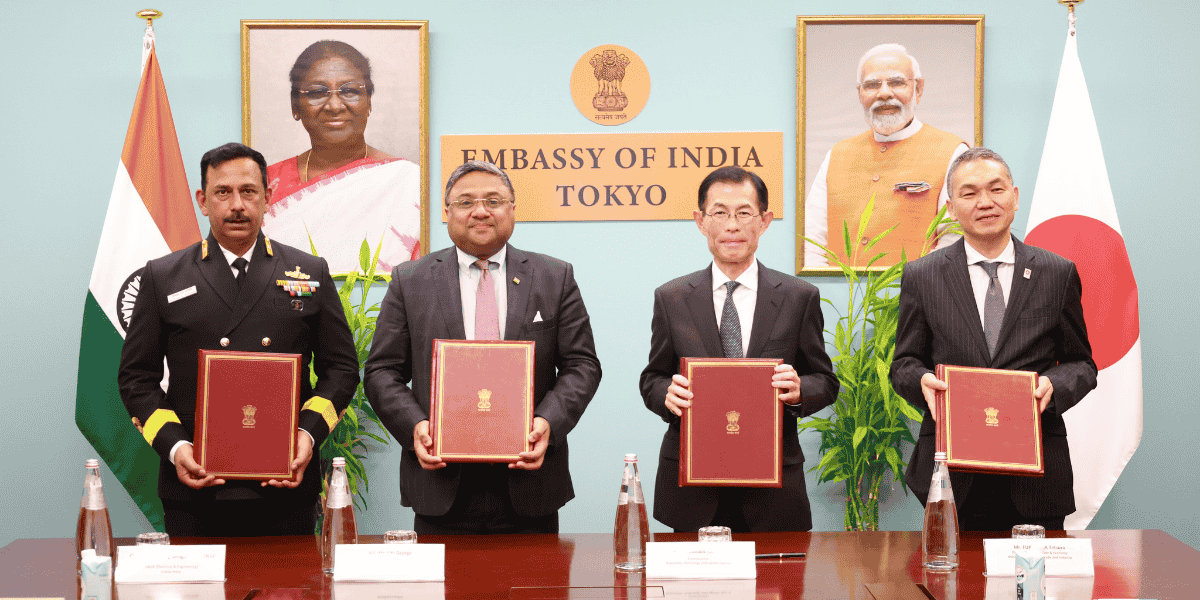India Looks For Tech Transfer In Fighter Jets, Subs, Advanced Radars As New Delhi Seeks Deeper Defense Ties With Japan

India and Japan’s bilateral ties have evolved into a robust pillar of their Special Strategic and Global Partnership, reflecting shared democratic values, a commitment to a free and open Indo-Pacific, and mutual concerns over regional security dynamics, particularly concerning China’s assertiveness.
Last month, Japanese Defense Minister Gen. Nakatani and Indian Defense Minister Rajnath Singh met in New Delhi to discuss “the growing importance and necessity of enhancing cooperation.”
To guarantee the security of sea lanes, which is essential for not only Japan and India but also for the region and global community, they emphasized the significance of “protecting sea lines of communication.”
“Japan and India share the ideal of striving for a peaceful and prosperous Indo-Pacific region based on the rule of law, and it is becoming increasingly important and necessary to further strengthen cooperation and collaboration in the field of defense,” Minister Nakatani said, referring to the complex and uncertain regional and international situations surrounding both countries.
One of the highlights of this meeting was that Minister Nakatani proposed the establishment of a new framework for defense cooperation, termed “Japan-India Defense Cooperation in the Indo-Pacific Region” (JIDIP/IJDIP), to facilitate more structured and comprehensive coordination.
Based on this idea, the two ministers agreed to significantly increase military service cooperation and collaboration, suggested creating a consultative body to oversee and manage advancements in Japan-India cooperation and collaboration from an all-encompassing and integrated standpoint, and promised to keep working in this direction.
This is the second time the defense ministers of the two countries have met in around six months; the last meeting was held in Laos in November 2024 as part of the 11th ASEAN Defense Ministers’ Meeting-Plus (ADMM-Plus).
The two nations signed the Memorandum of Intent in November 2024 to “co-develop” the UNICORN (Unified Complex Radio Antenna) mast, which is essentially a conical structure that improves a warship’s communications and stealth capabilities.
The transfer of cutting-edge radar systems for monitoring is the main objective of the “Unicorn Masts” agreement between Japan and India. These radar systems, developed by Mitsubishi Electric of Japan, are a vital tool in contemporary warfare due to their reputation for detecting even the most elusive items, including stealth aircraft.
To incorporate these radars into India’s defense systems, Japan’s top defense technology companies will collaborate with India’s Defense Research and Development Organization (DRDO).
Instead of dispersing among the ships, the “Unicorn Masts” is a sophisticated system of clusters of antennas that operate on a single support system—a single radar dome.
This increases the warships’ ability to move stealthily by obstructing the view of several radar cross-sectional sites. For marine operations, particularly in the disputed area of conflict, such an arrangement is essential.
It is noteworthy that, apart from the Philippines, India is the only nation to acquire such high-quality defense weaponry. This deal demonstrates Japan’s growing readiness to provide India with advanced military technology, as both countries face increasing tensions with China in the region.
Furthermore, through joint exercises, Japan and India have been fortifying their security ties in recent years. For instance, in March 2025, a joint military exercise called “Dharma Guardian” was conducted in Japan’s East Fuji Training Area.
Both nations are bolstering their defense ties by continuing to cooperate in the area of protecting maritime traffic for the safety of sea lines.

Additionally, India and Japan have been collaborating on defense technologies, with a particular emphasis on cooperation in fighter aircraft development, maritime security, and anti-submarine warfare (ASW).
Indeed, in a broad decision last year on March 15, Japan revised the implementation rules for its three principles on the transfer of defense technology and equipment and declared a relaxation of its position on the transfer of military equipment to friendly countries.
India is also looking to tap into Japan’s experience in building tanks and aero engines. For over a decade, Japan has been eager to strengthen its defense ties with India, but its plans were derailed when a 2018 sale of a multipurpose ShinMaywa US-2i aircraft to Delhi did not materialize.
The visit by General Nakatani coincides with reports that Japan has extended an invitation to India to join the Global Combat Air Program (GCAP), a joint sixth-generation aircraft project being developed by Japan, the United Kingdom, and Italy.
Combining the British Tempest and the Japanese F-X program, the GCAP aims to develop a state-of-the-art combat aircraft that incorporates cutting-edge technologies to ensure air superiority in a security environment that is increasingly contested in the Indo-Pacific and globally.
The purported offer was made a few months after the GCAP International Government Organization (GIGO) was legally established by Italy, Japan, and the United Kingdom, ratifying the GCAP treaty. In addition to defining capabilities, requirements, and managing the program’s industrial structure, this entity will be responsible for producing the next-generation fighter jet.
India could simultaneously progress work on its Advanced Multi-Combat Aircraft (AMCA) and gain vital technology and experience by joining the Global Combat Air Program (GCAP).

AMCA is a fifth-generation, multi-role, stealthy fighter jet for the Indian Air Force and the Indian Navy. It is designed to be a robust, weather-resistant aircraft capable of performing both air-to-air and air-to-surface missions.
Moreover, India could further leverage Japan’s cutting-edge submarines, especially its Soryu-class submarines, which are among the most sophisticated in the world, in addition to fighter jets.
Similar to the Soryu-class submarines, a 4,200-ton sub, regarded as the world’s greatest non-nuclear submarine, appears to be quieter and has longer endurance than any comparable sub, such as the German Type 214 and the French Scorpene.
The significance of a coordinated strategy to oppose China’s military tactics in the Indo-Pacific has been acknowledged by both India and Japan. As Japan enhances its military-industrial capabilities, India will be able to modernize its military capabilities through collaboration in high-tech areas, such as fighter jets and submarines.
An obvious indication of both nations’ desire to strengthen their military capabilities is the India-Japan defense cooperation, characterized by accords such as the technology transfer of Unicorn Masts and cooperative defense manufacturing initiatives.
Additionally, a change in Japan’s post-war pacifist posture is indicated by its increasing readiness to trade defense technologies with India.
In addition to responding to China’s growing military assertiveness, India and Japan’s bilateral relationship also reflects the changing security landscape of the Indo-Pacific region.
A new balance of power may emerge in the Indo-Pacific region, with Japan and India playing crucial roles in preserving peace and stability in the face of growing Chinese assertiveness, supported by their respective military developments.
- Questions and Answers
- Opinion
- Motivational and Inspiring Story
- Technology
- Live and Let live
- Focus
- Geopolitics
- Military-Arms/Equipment
- Безопасность
- Economy
- Beasts of Nations
- Machine Tools-The “Mother Industry”
- Art
- Causes
- Crafts
- Dance
- Drinks
- Film/Movie
- Fitness
- Food
- Игры
- Gardening
- Health
- Главная
- Literature
- Music
- Networking
- Другое
- Party
- Religion
- Shopping
- Sports
- Theater
- Health and Wellness
- News
- Culture

